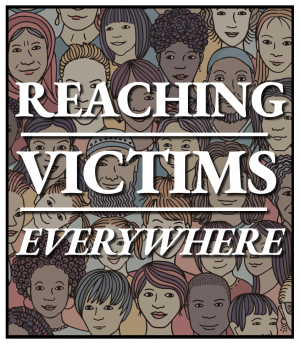Innovative Practices
According to the National Crime Victimization Survey, only 12 percent of victims of serious violence ever receive help from a victim services agency. This already-low number drops to 4 percent when the crime is not reported, which is the case for approximately 50 percent of violent crimes. To improve this reality, the victim services field must diversify and expand existing strategies for providing victim assistance and create vital links to other fields that come in contact with victims of crime—particularly those victims less likely to access services through traditional support systems. During FYs 2017–2018, OVC offered several funding opportunities to stimulate the field’s efforts in these areas, and some projects that began in previous years reached their implementation stages.
In FY 2018, under the Advancing Hospital-Based Victim Services Program, OVC made nine awards totaling almost $9.4 million to eight demonstration sites. These sites will implement and expand hospital-based and affiliated programs to support crime victims using evidence-based models and practices with victim-centered approaches. The program also funded a technical assistance provider to support the demonstration sites. Each site will work to expand the use of hospitals and other medical facilities as entry points to increased support for victims of crime, improve their outcomes, and prevent chances for repeat victimization.
OVC's Advancing the Use of Technology to Assist Victims of Crime Program supports grantees in developing innovative strategies to create, expand, or enhance the use of technology initiatives to improve response, services, and access for victims of crime. In FYs 2017–2018, OVC awarded $21.6 million for 15 organizations to provide access to victim services—including information, referrals, and tools—for victims in areas where local or accessible services are not sufficient to meet the needs of the community.
Rural and underserved communities generally struggle to support victims of sexual assault with specialized medical practices such as forensic exams. Under its Using Telemedicine Technology to Enhance Access to Sexual Assault Forensic Exams Program, OVC provided funding for the Pennsylvania State University (PSU) to develop and implement the Pennsylvania Sexual Assault Forensic Examination and Training (SAFE–T) Center.
In FY 2018, PSU enhanced access to high-quality sexual assault care in underserved communities through telehealth support at three of its four pilot sites—Penn Highlands DuBois in Clearfield County, Pennsylvania; Soldiers and Sailors Memorial Hospital in Wellsboro; and J.C. Blair Memorial Hospital in Huntingdon. The fourth, Geisinger Lewistown Hospital, will come online shortly. When a sexual assault examination is performed at these sites, one of SAFE–T Center’s expert nurses participates using specialized digital telehealth technology that enables him/her to speak with and support both the onsite nurse and the victim.
Through telehealth technology, the expert nurse can observe the exam in progress, ensuring best practices, proper evidence collection, and a safe, helpful environment for the victim.
OVC's Multidisciplinary Responses to Families and Communities in Complex Homicide Cases Program supports the enhancement of multidisciplinary interventions within 24–48 hours after deaths occur on some of the most complex types of cases, including gang-related homicides, intra-familial homicides, homicides involving child witnesses, and cases involving impaired driving- or DUI-related deaths.
Under the program, OVC has funded seven demonstration sites in Florida, Illinois, Maryland, New York, Pennsylvania, Ohio, and South Carolina, and one technical assistance provider. In FY 2017, program grantees began identifying promising, victim-centered, trauma-informed responses and evidence-based practices that can be implemented through partnerships between law enforcement and victim service providers. These programs also had to be effective at addressing the needs of families and communities affected by these types of cases, as well as identifying resources and lessons learned that OVC could share with law enforcement communities and victim service practitioners.
Victims of Elder Financial Exploitation
Older adults are especially vulnerable to violent crime, neglect, and exploitation, including financial fraud. The effects of these crimes can be devastating, and older adults may be targeted at rates that outpace the services available to help the growing number of victims. Further, elder abuse may be difficult to detect, as the perpetrator may be a caretaker, family member, or other individual on whom the victim must rely for basic needs. Therefore, victims may be reluctant to report the crime if it requires reporting a family member or results in a loss of personal independence.
OVC supports advocates, service providers, researchers, and policymakers across the Nation in their efforts to address elder abuse. In FY 2017, OVC began a Field-Generated Innovations in Addressing Elder Financial Exploitation Program. Through this program, OVC awarded a total of $3.4 million to eight sites to focus on elder financial exploitation through innovative collaborations between the financial industry and others, to better detect and respond to victims. These efforts will build the capacity of victim service providers and financial industry representatives to enhance fraud detection and provide trauma-informed, age-appropriate services and resources for older victims of financial exploitation.
OVC's Elder Justice AmeriCorps Legal Fellowship Program expects to serve more than 8,000 older adults over the next 2 years to help address the myriad legal needs of victims of elder abuse, neglect, and financial exploitation. The program fellows have been co-located in seven of the OVC-funded legal clinics across the country to further promote building pro bono capacity in the field.
Expanding Legal Assistance to All Victims
Victims of crime often have a range of legal needs stemming from their crime victimization, including a necessity for comprehensive, no-cost legal services to respond to the various co-existing and overlapping legal needs that often arise in the wake of victimization. The Vision 21: Transforming Victim Services Final Report identified substantial gaps in the provision of legal services to victims of crime, and the tremendous need to increase legal services for crime victims. OVC continues to expand legal assistance to crime victims through innovative efforts to provide comprehensive, pro bono legal assistance and expand the capacity of legal providers to support victims with holistic help throughout the complex criminal justice system. These efforts include representation in the enforcement of victims' rights during the criminal justice process, a wide range of civil legal assistance directly related to victimization (e.g., child support, custody, employment, landlord/tenant issues), and assistance for victims of identity theft and financial fraud.
In FY 2017, as part of the Increasing Legal Access to Victims of Crime: Innovations in Access to Justice Program, OVC awarded nearly $3.1 million to the National Crime Victim Law Institute (NCVLI) to provide training and technical assistance for developing innovative methods to increase crime victims' access to legal services at several rural demonstration sites.
In FY 2018, OVC launched the Initiative to Enhance Crime Victims' Rights Enforcement and Victim Access to Legal Services. Through this program, OVC provided $6.9 million to NCVLI to support the enforcement of victims' rights at the state and federal levels. The program will also allow training on victims' rights for local advocates, attorneys, law students, and other allied professionals.
For additional information, please visit OVC's website.




